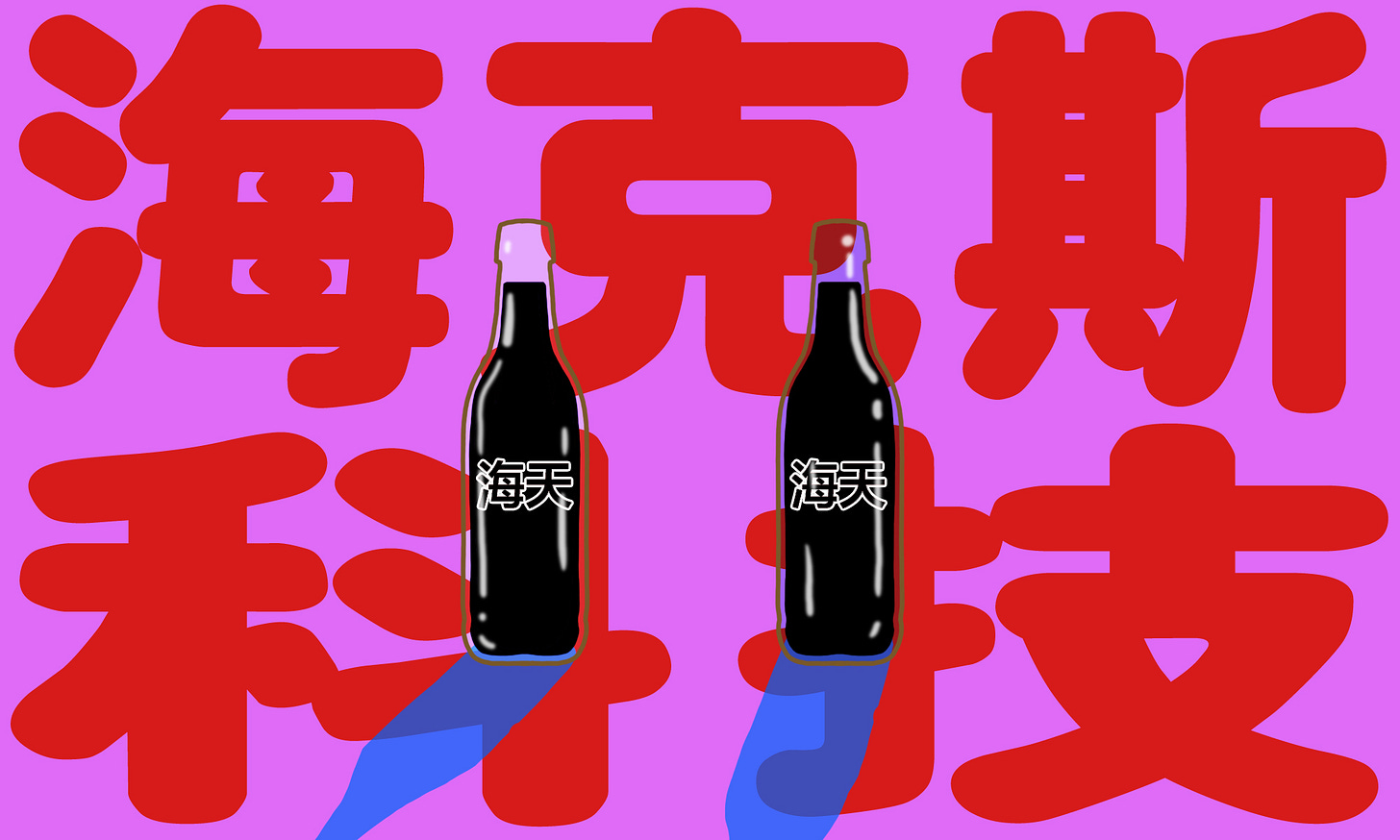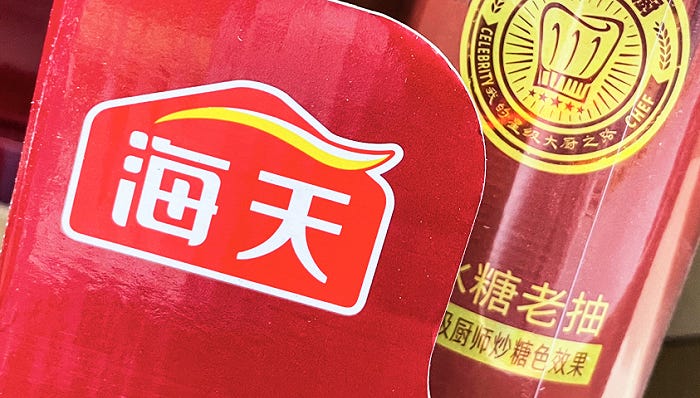Welcome to RealTime Mandarin—a multimedia resource to immerse you in the latest Chinese language trends, inspire you to practice and improve your Mandarin every week, and empower you to communicate with confidence.
Subscribe now to get the next issue straight to your inbox!
China’s biggest soy sauce brand is Hǎitiān 海天.
Known as the Moutai of soy sauce (酱油茅 jiàng yóu máo), the company which owns the brand, Haitian Flavoring and Food Co (海天味业 hǎi tiān wèi yè), is also the world’s largest soy sauce manufacturer.
Haitian was at the centre of a social media storm during the National Day holiday week, accused of ‘double standards’ (双标 shuāng biāo).
According to videos posted online, Haitain soy sauce sold in Japan contains only natural ingredients such as water, soybeans, and wheat. The same product in China, however, contains additives (添加剂 tiān jiā jì) like flavour enhancers, preservatives, and sweeteners.
Haitian quickly released a statement in response, saying that all its products comply with China’s Food Safety Laws; a second statement explained additives are widely used in food manufacturing in markets around the world.
The posts went viral, fuelled by consumers’ longstanding food safety concerns, and suspicions of Chinese brands using inferior ingredients for the domestic market compared to those for overseas markets.
Haitian surprisingly didn’t try to hide its attitude, which made netizens feel that the company was not being sincere. It was because of this that the two statements did not calm public opinion, and instead made it worse. There were even netizens who said: “You can chose to make statements, I can chose not to buy. You can decide what to add to make products compliant, but I can decide if I buy them”.
海天味业依然没有掩饰强硬的态度,让消费者看不到诚意。正因如此,两次回应都没有平息舆论,反而越描越黑。甚至有网友表示,“你选择发声明,我选择不买”“合不合法是你的事,买不买是我的事”
It was a PR disaster for the company. Once a darling for investors in China’s capital markets, the company’s share-rice almost halved, and consumers have started to boycott the brand:
With the rising purchasing power and ever-more sophisticated consumer tastes in China, the demand has changed from having enough to eat to wanting to enjoy it. In this ‘double standards’ incident, Haitian's failed response has led to consumers deserting the brand.
随着消费水平的提高和观念的升级,消费者需求已经从吃饱,变为吃好,“双标”事件中,海天失败的回应导致的消费者逃离
Conversations about this story are full of interesting language.
There’s ancient wisdom from some of the oldest written works in the Chinese language…
道德经有云:五色令人目盲,五音令人耳聋,五味令人口爽。古人的智慧,诚不我欺。而这,恐怕才是这场风波带给我们所有个体最重要的启示与思考
The Dao De Jing says: too many colours will make you blind, too much music will make you deaf; too many flavours will deprive the mouth of taste. Ancient Chinese wisdom does not lie. This is perhaps the most important lesson this incident has taught each of us.
Here, ‘five’ 五 wǔ means ‘many’ and is not translated literally.
The Dàodé Jīng is believed to have been written around 400 BC by Lǎo Zǐ 老子.
And as well as classics, the online commentary also has newly coined phrases which started life in online games.
It’s a linguistic feast made with the finest ingredients!
Favourite Five

1. …茅 máo
the Moutai of … sector; biggest company in its sector
资本市场已经不再看好海天味业,曾经的“酱油茅”跌落神坛 - The capital markets have lost confidence in Haitian. The Moutai of soy sauce has now fallen.
We have learned this before, with other ‘Moutai’s of’ including:
光伏茅 guāng fú máo - the Moutai of solar is Longi (隆基股份)
电池茅 diàn chí máo - the Moutai of batteries is CATL (宁德时代)
2. 越描越黑 yuè miáo yuè hēi
the more you say the worse it gets
两次回应都没有平息舆论,反而越描越黑 - Two statements did not calm public opinion. In fact it has made things worse.
3. 海克斯科技 hǎi kè sī kē jì
Hex technology
“海克斯科技”一词火了起来,成了海天味业及其他工业食品的标签 - ‘Hextech’, a term trending on social media, has become a negative label for Haitian and other food products.
Related: 科技与狠活 kē jì yǔ hěn huó - ‘technology and filthy work’ means something similar, relating to food additives. Both phrases are from the game, League of Legends. See more in China Project Phrase of the Week.
4. 开门七件事,柴米油盐酱醋茶 kāi mén qī jiàn shì, chái mǐ yóu yán jiàng cù chá
the seven basic necessities: firewood, rice, oil, salt, sauce, vinegar and tea
俗话说,开门七件事,柴米油盐酱醋茶。其中,酱便指的是酱油,一瓶小小酱油的背后是一个庞大的市场 - As the saying goes, there are seven basic necessities: firewood, rice, oil, salt, sauce, vinegar, and tea. Among them, sauce refers to soy sauce, and behind that small bottle of soy sauce is a huge market.
More: Zoe discusses the background of this phrase in the podcast @ 21 mins. It’s originally from a poem by Ming Dynasty poet, Táng Yín 唐寅. As well as an accomplished poet, Tang Yin is also one of the most notable painters in the history of Chinese art, and one of the ‘Four Masters of Ming dynasty’. The four-line poem:
柴米油盐酱醋茶,
般般都在别人家。
岁幕天寒无一事,
竹时寺里看梅花。
5. 推波助澜 tuī bō zhù lán
make waves; make things worse
在调味品的全球工业化进程中,整个供给端似乎扮演着推波助澜的角色 - As the manufacturing of condiments has become more industrialised around the world, the supply side seems to have exacerbated the issues in the industry.
Related: other ways to say ‘make things worse’ which we’ve learned before:
雪上加霜 xuě shàng jiā shuāng - adding frost to snow
火上浇油 huǒ shàng jiāo yóu - adding fuel to the fire
Consuming the Conversation

Useful words
A few words tracing the fall of Haitian.
桂冠 guì guān
laurel; a crown
2014年,顶着“调味品之王”桂冠,海天成功登陆A股 - In 2014, as the undisputed king of condiments, Haitain was listed on the stock market.
翘楚 qiáo chǔ
outstanding person
海天无论是人均产量还是人均产值,都是同业翘楚 - Haitian is the best in the industry in output per capita - both in terms of volume and value.
Note: traced all the way back to the 诗经 shī jīng, Book of Songs, Book of Odes, the oldest collection of Chinese poetry, with 305 works dating from the 11th to 7th centuries BC.
腰斩 yāo zhǎn
cut at the waist; cut in half
已经下跌45.6%,市值几近腰斩 - The share price has fallen by 45.6%, with the market cap nearly halved.
重拾 chóng shí
regain
经历此次风波后,海天味业想要重拾消费者的信赖并不容易 - After this crisis it will be very difficult for Haitian to regain trust of customers.
孰料 shú liào
guess what
孰料半年过去,一场不期而遇的添加剂风波,令海天陷入风雨飘摇之中 - Who would have thought that in just half a year, an unexpected crisis about additives would have embroiled Haitain?
Note: more written way to say 没想到 méi xiǎng dào; 孰 shú means who.
Three-character phrases
不买账 bú mǎi zhàng
not buy; not accept something
消费者显然并不买账,舆论也跟着继续发酵 - Consumers don’t accept it, and public opinion continues to worsen.
护城河 hù chéng hé
protective barrier













